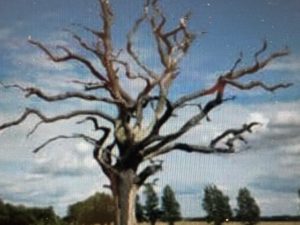Why did Jesus pick on the poor fig tree? Especially when it wasn’t time for figs to be ripe? Well, Mark tells us Jesus was hungry (Mark 11:12). Apparently, then, Jesus became “hangry?” He saw the leaves and went to see if by chance this tree fruited earlier than usual. Then, when it didn’t, Jesus arranged for it never to bear fruit—ever again.
ripe? Well, Mark tells us Jesus was hungry (Mark 11:12). Apparently, then, Jesus became “hangry?” He saw the leaves and went to see if by chance this tree fruited earlier than usual. Then, when it didn’t, Jesus arranged for it never to bear fruit—ever again.
I don’t think so, for lots of reasons. For one: Jesus often knew things that most didn’t—like what people were thinking (Mark 2:8; see John 2:24-25). Surely then he could have known he’d find no fruit on that tree at that time of year. For another: On occasion Jesus commanded the elements of nature, stilling storms, multiplying loaves of bread, turning water into wine. Instead of cursing the tree, why not grow fruit on the tree? Indeed, that would go well with what he says about having faith that could “move mountains,” which is one of the take-aways from this episode (Mark 11:23). Finally, this is a curious incident for the gospel writers to include in their account of Holy Week, if it’s only about hunger and disappointment at finding no figs. Curious, unless there is more going on. I agree with scholars who suggest there is more.
I understand this as an enacted parable about one tree at the beginning of Holy Week that helps us see more clearly what will happen on another tree toward the end of Holy Week. Consider some of the reasons.
The prophets of Israel often portrayed God’s word through dramatic acts. Ezekiel laid on his side (Ezek. 4); Jeremiah wore a yoke around his neck (Jer. 27); and Isaiah walked around naked and barefooted (Isa. 20). Such portrayals vividly and memorably “declared” the Word of the Lord to the people.
Further, God’s covenant people, blessed to be a blessing, called to be a Royal Priesthood and a Holy Nation, and a light to the nations, had been likened to a vineyard planted by the Lord (Ps. 80; Isa. 5) and Jesus in his teaching had used the Fig Tree as a symbol of the People of God (Luke 13:6-9; compare Jer. 8:13). As such, God called the people to account for their lack of fruit—despite being planted and nurtured by the Lord.
Finally, all the accounts of Jesus and the fig tree are in the context of Jesus “cleansing” the Temple. Mathew tells of Jesus’ cleansing the Temple immediately after his reception into the city on Palm Sunday (Matt. 21:1-13). The following morning, on the way back to the Temple, Jesus curses the barren Fig Tree and it immediately withers from top to bottom (Matt. 21:19-20). Then once he enters the Temple, the Chief Priests and Elders demanded to know how Jesus has the authority to act as he has—not least the day before in the Temple (Matt. 21:23-24ff.)
In contrast, Mark tells the fig tree story so that it brackets his cleansing of the Temple. So, Jesus first curses the barren tree, then enters a barren Temple and cleanses it—denouncing what it had become and declaring what God intended the Temple to be. Then the Disciples see what happened to the barren tree Jesus cursed as they leave the barren Temple he has just cleansed.
In other words, Jesus was not “hangry.” The Fig Tree and what happens to it prefigures the Temple and what will happen to it—immediately when Jesus “cleanses” it and later when it will be destroyed by the Roman army (see Mark 13:1-2). Jesus illustrates the judgment that awaits a barren Temple by “judgment” upon a barren tree.
Commonly, readers of the gospel express a bit of sympathy for the Tree. After all, the gospel notes it was not the time for fruit and still the Tree is judged! Yet, even at this point, there is more going on. It was the time or the season for the Temple to bear fruit. God had patiently dealt with the people and their leaders, bearing with them and forgiving them, but now they reject and kill the Messiah God has sent for them. If, then, Messiah pronounces judgment on the barren tree out of season, how much more upon the Temple when its season has come? If the tree, woe to the Temple!
The trouble with the Temple, Jesus’ said, was its leaders had made it a “den of thieves” or “the headquarters for rebellion against God,” and thus were robbing God of harvest-fruit. (The word for “thieves” here had this note of insurgency and rebellion packed into it, compare the parable in Mark 12:1-11). Jesus’ cleansing signaled a new kind of Temple that would bear fruit as a House of Prayer for the nations, a center for gathering the nations into the presence of God at last.
Before that can happen, however, Jesus must encounter another accursed Tree at week’s end. In this Tree the corruption of the Temple and its barrenness plummets to its worst expression as the Holy One assumes and accepts its curse for us all. (Indeed, as the Law declares: cursed is everyone who hangs upon the tree—see Deut. 21:23, Gal. 3:13-14)! But, then, having suffered and succumbed to the curse, that same Holy One tears apart the Heavens (Mark 15:37-38) and opens the floodgates to shower the world with the blessings of righteousness, peace and joy in the Holy Spirit (Rom. 14:17).
Therefore, consider this:
- The Lord God of all so loved the world and us that he bore the curse that rightly fell to us—including His people then and today.
- In so doing, the Lord holds the world and his people accountable for the barrenness of their lives, in order to remove it once for all.
- Then, the Lord builds the true Temple, the community of loving intercessors whose prayers connect the needs of the outcasts—near and far—with the resources of heaven.
- This is who Jesus’ followers are: that community rising up and flowing forth to the ends of the earth.



